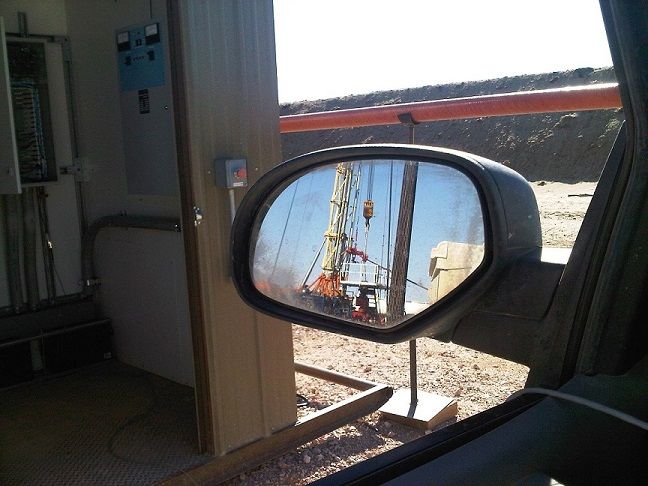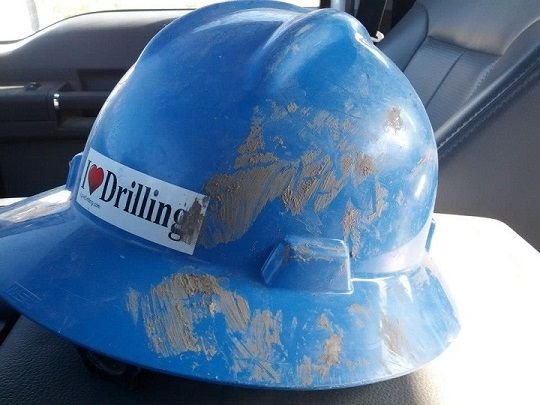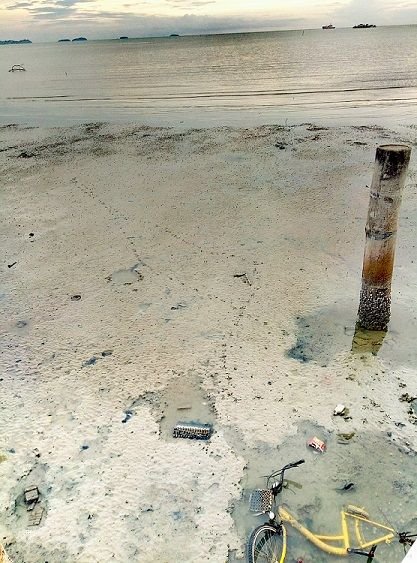In Non-Defence of a Semi-Unrepentant Oil Junky
As someone who used to work in the oil and gas industry, I get a lot of interesting responses from people I meet when they find out about my past career. The second most common assumption I get is that I left the oilfield because I had some sort of epiphany about how evil the industry is.

Programming the control system for an oil well in Wyoming
I’m not about to defend the oil and gas industry. Yes, some oil and gas firms have engaged in attempts to mislead the public on climate science, which is obviously bad; but the industry as a whole is no more corrupt or prone to buying politicians than any other major industry. What I do want to talk about here in this post is my own analysis of what informs some peoples' assumptions about my motivations for leaving the oilfield and, more importantly, make the argument that I am still just as complicit in the destabilization of the climate now as I was when my paycheques were issued by oil companies.
Let’s deconstruct the sentiments behind the epiphany assumption. It basically goes something like this: Only bad people, those who either don’t agree with climate science or who simply don’t care about its validity, work in the oil and gas industry. It follows, then, that someone like me who leaves that line of work possibly did so because of a guilty conscience.
Leaving the obvious aside, there is a deeper statement at work here that I want to focus on. Most people I meet generally tend to like me (or, at least, that’s my impression). They think I’m a nice person and, therefore, as a nice person they assume (and often plainly state) that I left the oilfield because I agree with the logic of the epiphany assumption: Once I became conscious of the fact that I was participating in bad stuff, I chose to leave. The assertion here is that I was a bad person for working in the oilfield, but now I am good because I no longer actively contribute to the destruction of the climate and environment.
But what really changed? At this point, I am still an enthusiastic consumer of all sorts of products derived directly from the extraction of fossil fuels (jet fuel being probably the most notable of them). In addition, the thing that nearly everyone forgets is how the economy of the entire world literally operates on fossil fuels. Truck drivers in the US are often quick to point out that, “If you bought it, a truck brought it.” In other words, there is nothing you or I purchase or consume that wasn’t at least delivered by a truck powered by diesel. Also, we often use some form of transportation requiring fossil fuels to go purchase that product. But realizing the role that the oil and gas industry plays in transporting a good to market and in transporting consumers to the goods is just the surface of the problem: One must consider all the links in the supply chain from producer to consumer and how the raw materials, production processes, and transportation methods at each step are soaked in oil, just to gain an appreciation for the true carbon footprint of any consumer good.
I’ve spent a bit of time this year walking along the oil-soaked coastlines of cities in Indonesia and Malaysia. The waters of any port city here are polluted from oil that inevitably leaks from shipping traffic. Now, some people might quickly blame the oil and gas industry for that mess. However, in the case of pollution like that pictured above, the industry isn’t even directly responsible: it’s shipping companies and their leaky boats that are to blame (an oversimplification, but you get the point). And let's not forget that the shipping industry is responsible for double the CO2 emissions of the aviation industry. So, in a world where many, many products are made in China, we could probably amend the truckers’ adage above to: “If you bought it, a ship brought it and then a truck brought it.” All of us, as consumers, are at the pinnacle of a very deep and complicated chain of fossil fuel consumption--and all of that is without considering the ecological damage inflicted by the extraction of raw materials used to make the goods being shipped or the often harmful effects of certain production and manufacturing processes.
So, I’m clearly not such a nice guy, after all…and neither are you. The epiphany assumption makes the unspoken assertion that all of us who don’t work for an oil company are somehow more righteous in that we are more aware of our impact on the environment and climate, and are (supposedly) making more of an effort to reduce that impact. But that’s not true. I doubt there is anyone reading this who would actually make the sacrifices necessary to reduce their carbon footprint to a sustainable level.
I’m not trying to shift blame from the oil and gas industry to consumers. That’s an equally facile argument. Rather, instead of pushing for incremental changes that look eco-friendly on the surface, we should be talking about revolutionizing the (sometimes) hidden environmental impact of even the most well-intentioned products. There are structural issues to confront here concerning how goods are produced and transported that is completely absent from discourse on reducing one’s carbon footprint. While I won’t dispute that reducing individual consumption and refusing to purchase certain products might make some sort of impact within the marketplace (the supposed power of consumers being an article of faith of global capitalism), consumer action alone cannot bring about the vast structural changes that are required to really make a difference. It might make us all feel good to cast someone as the bad guy, but we need to look beneath the surface and confront these ugly truths if anyone wants to work toward creating actual change. If, on the other hand, all you want to do is wear your anti-oil badge on your sleeve by pretending that using canvas grocery bags or removing oil companies from your investment portfolio will change the world, I don’t want this blog post to be the cause of any lost sleep.



Lol. Never really thought about it like that. Live in oil refinery metropolis. I am always angry that it smells depending on the way the wind blows, the leaks...which are so numerous. Not just oil but the chemicals needed. Again in this metropolis all jobs come from it. We are the cancer center of the US because of this. I’m always frustrated when I see the income of oil people and the way they live like they aren’t making the money. Fact is oil is how we have plastics which are everywhere and types. We have tires/rubber in all shapes and forms. The engineering companies that have branches because of oil that have seem to nothing to do with it. Paint. Never thought the oil guy was the bad guy. It’s hard and sometimes deadly, not from the region but because of equipment. Glad you survived and I don’t have to think about a life without oil or it’s biproducts.
It is rather easy to slip into that epiphany mindset, I admit. lol
It's something I've struggled with before and since ... it's the same sort of tensions I feel between being an idealist and a pragmatist. I haven't decided completely yet.
Petroleum is not only used for energy/fuel purposes, but necessary for the modern economy to function. Petroleum is refined into products ranging from fertilizers, plastics, cosmetics, and pharmaceuticals. Only the myopic and ignorant would think that by putting up a few solar panels on their roofs, they've performed the necessary "sacrifice" in limiting the use of oil.
If the leaders of the first world countries are truly serious about climate change and are willing to act upon the supposed CO2 induced problems, then they better expend enough resources to expand their security apparatus, a la China and Russia, to quell the inevitable civil unrest and disorder resulting from massive wealth contraction due to discontinuing oil and oil-product use. As such, the Paris Climate Accord is nothing more than a self-congratulatory PR photo-op for narcissistic politicians deluding themselves into "saving the world" by the most minuscule diminution of petrol-based product use in their already gluttonous society.
That's basically my point, as well. However, I'd say that most people (maybe, being generous, through no fault of their own) fall into the "myopic and ignorant" category. If you look at the general discourse surrounding the reduction of fossil fuels, it focuses on consumer-level transportation and other consumer-based strategies that, at best, only marginally reduce one's impact. These problems are structural in nature, but many people perform certain rituals and engage in practices that signal a desire to fix things, yet nothing substantive is ever achieved. Much of modern politics is based on good will and aesthetic markers of which tribe one belongs to: these things don't create change and certainly not fast enough to do anything meaningful for the problem at hand.
After ten intense and interesting years being employed in the oilfield as DST/TCP Supervisor,I quit as well over a year ago. Not because I don't need a job, nor because I felt guilty or bad of being part of the business: simply because I felt they were squeezing me too much as they laid more and more people off,and I was missing out on so much more life has to offer. To really make a change we need a collective, global, change in thinking, and employ the technology available where needed, not to who offers more currency. The same people judging you as good or bad most probably drive a car and do use plastics and other derivatives from petrol in one way or another... but that's today's world, where public relations is king and facts don't matter.
Peace to you though :)
The biggest waste of oil and resources come from the military industrial complex. Thank you for your great post.
Very interesting analysis.
The fact that the world economy runs on fossil fuels almost exclusively yet is one of the biggest hurdles we as a society face when it comes to living in a way that doesn't destroy the very planet we all come from. Living in general, really.
In my opinion, this is where information on zero-point energy/free energy models would come into play as far as energy consumption. If you took a tea cup of this zero-point energy and released it all at once, it would boil off all of the water on the earth's surface instantaneously. If more people actually took things like that seriously, we could start making some serious head way with revolutionizing our economy in a way to where we would be able to commit to the creation of vehicles and products that do not use fossil fuels as a source of energy. Imagine having a vehicle that uses a device that pulls energy directly from the field of energy around us, that creates us and everything we see. There are patents for such devices that have been kept hidden from the eye of the public until recently with all of the whistleblower testimony in the last few years.
It seems as though there has been a suppression of science and technologies that would free us of petroleum dependency, and it is going to take a lot of people to learn the information necessary to start demanding that we move out of petroleum and into more sustainable energy sources. This would lead us to start exploring the possible technological innovations that would launch us into an era where we would not only be able to leave the petroleum industry behind entirely, but be free of feeling like we have to participate in the 9-5 grind in order to live.